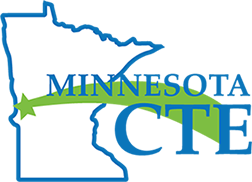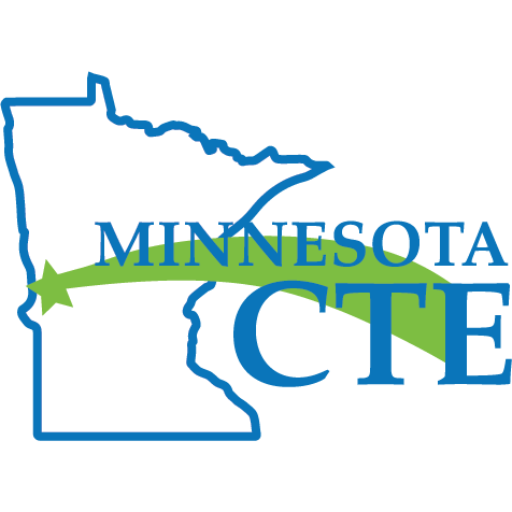Minnesota’s most popular Work-Based Learning endorsement program.
Flexible/online. Self-paced. Grant funded.
More than 450 teachers to date have earned their licenses through our programs. Our programs provide a personalized and efficient path to licensure without tuition, grades, textbooks, or the traditional confines of the academic year.
Jump to: About the Work-Based Learning Licensure Endorsement | About our Licensure Program | Program Enrollment | Program Cost | Program Standards | FAQs
About the CTE Work-Based Learning Endorsement
A Minnesota CTE teacher with the Work-Based Learning (WBL) licensure endorsement (160000) is authorized to provide instruction to students in grades 9 through 12 that enables students to learn through work and to consult and collaborate with families, other teachers, and business, industry, labor, and community representatives in designing, implementing, and evaluating student learning through work. This licensure endorsement can only be applied to a teaching license in grades 9-12. School counselors, principals, or others with services or administrative-only, non-teaching licenses cannot add the endorsement. Individuals with only an elementary or middle grades, non-9-12 license also cannot add the endorsement.
Rule 8710.4825 defines WBL as “learning through paid and unpaid work-based experiences where the worksite is the educational setting for one or more hours of the school day or week for one or more quarters or semesters of the school year.”
Note: It is inaccurate that teachers coordinating WBL experiences less than 40 hours are not required to hold the licensure endorsement. While MDE Rule 3505.4300 may specify that teachers must hold the WBL endorsement when a CTE program includes placement of paid or unpaid learning experiences of more than 40 hours, that does not mean they do not need it if the experience is less than 40 hours. Further, this definition only applies within the context of MDE program approval; teacher licensure is under the authority of PELSB, not MDE. PELSB defines WBL as “one or more hours of the school day.” We recommend all CTE teachers possess the WBL endorsement.

Courses in CTE: Work-Based Learning
About our Licensure Program
Our online, flexible Work-Based Learning licensure program is both initial licensure for teachers new to the profession who are industry experts (i.e., Tier 1) and working toward permanency (Tier 3) who are also enrolling in another one of our CTE licensure programs, and additional licensure for teachers who hold a current teaching license (Tier 3 or 4) and are looking to add another licensure area. Initial licensure candidates must also be enrolled in another one of our CTE licensure programs, as a candidate for this license must hold “another Minnesota license valid for teaching in grades 9 through 12” (8710.4825). Individuals without either industry experience or teaching experience (e.g., a recent high school graduate) would be best served in a traditional teacher preparation program. Non-CTE teachers looking to add the WBL endorsement would be best served in another PELSB-approved WBL program.
Enrollment Requirements
To enroll in our PELSB-approved teaching licensure endorsement program for Minnesota 9-12 Work-Based Learning, candidates must meet just four requirements:
- Currently be the Teacher of Record for a Work-Based Learning course (Tier 1, Tier 2, or an OFP in CTE WBL or Special Education WBL), or you must have a job offer specifically for a Work-Based Learning assignment in a Minnesota school district.
- Specific to the WBL endorsement: An active Minnesota teaching license (administration and related services are not eligible) in grades 9-12 or enrollment in one of our initial licensure programs. We are not able to enroll an initial licensure candidate for only the WBL endorsement without also enrolling in another one of our CTE licensure programs, as WBL is an endorsement, not a full license.
- Non-CTE teachers wanting to add the endorsement may not be eligible for our programs, due to our grant funding requirements.
- Experience working with students.
- An interview with program staff.
Removing barriers to licensure.
Cost
ENDORSEMENT
$3,500
This program is generally free for CTE teacher candidates accepted into the program thanks to grant funding from
the federal Perkins Grant and the Minnesota Service Cooperatives’ CTE Consortium Grant.
Program Required Standards
Our licensure program is flexible and self-paced. We start by mapping out any current industry experience, teaching experience, and prior knowledge or coursework you have to specific licensure standards; we do not need you to complete extra work for standards you are already an expert in. We then design a custom plan with you for any standards that are unmet and you need help with. This usually looks like professional development, online modules, participating in teacher organization trainings, etc.; a custom experience that best fits how you want to learn. Throughout the program, and even after program completion, we provide mentoring, coaching, curriculum, and resources to ensure your success. Ultimately, when you are able to show proficiency in all of the standards, we recommend you to PELSB for licensure.
Rethinking teacher preparation.
Step One – Core Skills
Core Skills for Teachers of CTE (8710.8000)
COR standards are not a requirement of the WBL endorsement, but are required within all of LCSC’s programs; LCSC uses COR to demonstrate some of the WBL standards. Candidates may complete the Core Skills standards by participating in an in-person professional development conference offered by LCSC (i.e., CTE Core Bootcamp). After completing the learning experience, candidates submit evidence documents in Proserva to document their learning. We will also recognize prior learning to demonstrate the standards if candidates provide evidence of previous professional development (e.g., CTE TIP), post-secondary coursework, teaching experience, etc.
Step Two – Pedagogy/Methods
Standards of Effective Practice (8710.2000)
SEPs are not a requirement of the WBL endorsement as candidates either already completed the SEPs in their initial license, or will be completing them in the license paired with the endorsement.
Step Three – Subject Matter
Teacher Coordinator of Work-Based Learning (8710.4825)
Candidates complete online professional development or individualized training offered by LCSC to complete these standards. We will also recognize prior learning to demonstrate the standards if candidates provide evidence of previous professional development, post-secondary coursework, teaching experience, etc.
Step Four – Clinical Experience
Clinical Experiences (8705.1010)
A minimum of 80 clinical hours at the end of the program. Candidates serve as teacher of record and teach within their own classroom. Initial licensure candidates seeking another license with LCSC may extend their 12 full-time weeks of face-to-face student teaching at the end of the program by 80 hours (i.e., 14 full-time weeks) for their clinical.



